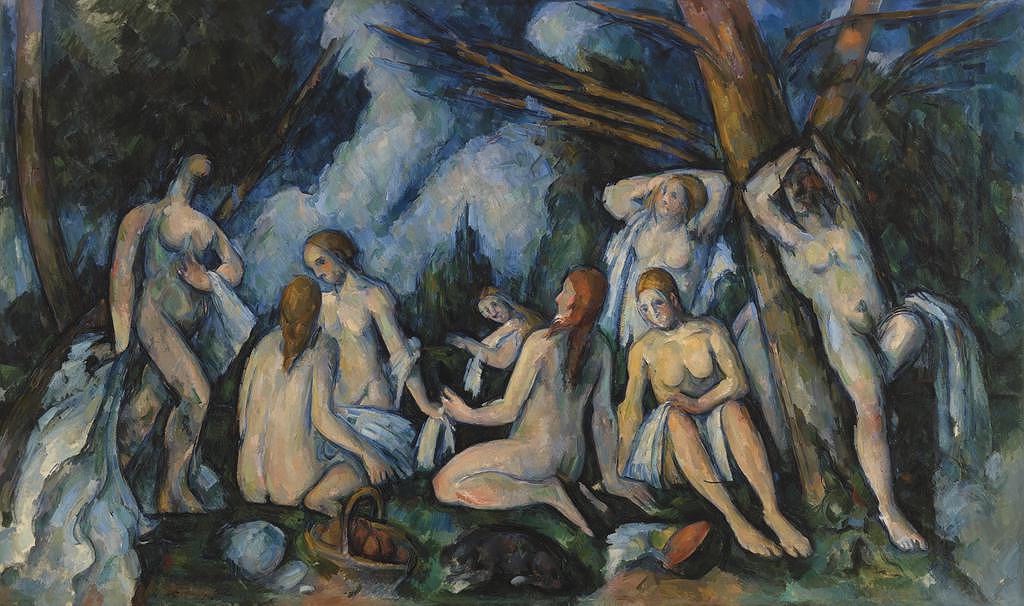SecondGuessing

Paul Cézanne: The Large Bathers [Les grandes baigneuses] (c. 1894–1906)
"I'll feel grateful for any future acceptance and unsurprised by any upcoming rejections …"
©2022 by David A. Schmaltz - all rights reserved
Rather than reassuring myself, Proofing my manuscripts encourages me into SecondGuessing what I thought I was accomplishing when I wrote them. I try to read each cleanly, as if I was just any old reader, but I know my voice too well to avoid jumping ahead. I also know my thinking too well to enter or exit very innocently. I might not remember precisely what I said, but I well understand how I tend to say stuff, and my logic sometimes seems entirely too predictable and precious. I sense the next glibness coming and almost cringe watching it arrive. I've seen my stand-up routine too often to find my jokes funny or insightful anymore.
I wonder what utility my Proofing brings, but I already know the answer. I plead with myself to get out of Proofing in the same way that a child might try to get permission to avoid a despised chore, knowing the exercise will prove futile but trying to get away with something anyway. I feel responsible for performing one final check on the contents, to wonder what I thought I was doing one more time, to question whether the finished work belongs out in the world or buried in the bottom of a back bedroom closet. I might not be adding a lick of value—I long ago acknowledged that I'm my own worst editor—but since I'm my only editor, I'm also my best editor available. I will try to catch the dangling participles, my favorite misuse of the language. I will wonder how the work might have been different and usually fail. I will flail but manage to complete the assignment, though I'll leave feeling disquieted by the experience. I might hold even more questions following the Proofing than I held before I started. I will most certainly have assembled a few fresh misgivings.
I consider it a violation of some principle to insist upon unbridled optimism. A proposal should properly involve uncertainty, a few unanswered questions, and ample space for speculation. I need not properly envision my work's future to propose a path forward for it. Nor do I need to feel confident in its relevance to more broadly share it, for each share, each proposal, represents another question and provides yet another opportunity for SecondGuessing. A proper manuscript, I suggest, might well be firmly grounded upon a pile of SecondGuesses, many of which will remain open questions regardless of effort focused upon resolving them once and for all. Each considering might uncover a fresh layer of SecondQuestions, then third, fourth, fifth, sixth, seventh, unto ad infinitum more, each perhaps fundamentally unanswerable. SecondGuessing might not be very much about definitively answering any question, but more about opening for further consideration even if the inquiry resolves nothing. At least the question was asked. At worst, a resolution guessed.
Knowing that I cannot resolve a question leaves me guessing. I cannot, for instance, by merely reading my own work, ever really gain a sense of how a virgin reader might react to it. I do it anyway, playing their role in my own literary cosplay, imagining myself interpreting the experience. I leave with more questions than answers, which, I reflect, might be the point of my exercise. How pitiful an author might I prove to be should I shrink away from asking merely because my questions would most certainly prove unanswerable? Isn't that how deep dark secrets begin and how unspeakables start? I insist upon an open process even though I know for fairly certain that by opening, I might not be closing anything. The result, of course, feels more like insults than reassurances. I am never enthralled when reading my own prose. I leave wondering if the work I read deserved to be read or if I produced the great Dead-Upon-Arrival Novel.
I hold my resulting misgivings close to my heart, for they serve as my insurance that I'm not engaging in some naive quest. I become less vulnerable, I imagine, to later criticism from publishers and actual readers if I've already subjected myself and my work to my own heartfelt SecondGuessing. I'm armor-plating, if you will, for the possible worst case scenarios ahead. It could be that the editor or agent rejects the whole business without comment. I've already written the scathing review when I passed everything through SecondGuessing. Should the world find the work pleasing, I'll take the reassuring and encouraging words, knowing, or at least suspecting, that they might well be a little over-generous. As a writer, I produced what I produced. I know I gave little attention to whatever use my work product might be put to next. My Authoring, my SecondGuessing, dresses up the raw material tor forward consideration. I know what's flesh and what's window dressing. I'll feel grateful for any future acceptance and unsurprised by any upcoming rejections, for I will have by then already completed my SecondGuessing.


